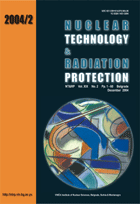
MODERN X-RAY SPECTRAL METHODS IN THE STUDY OF THE ELECTRONIC STRUCTURE OF ACTINIDE COMPOUNDS: URANIUM OXIDE UO2 AS AN EXAMPLE

December 2004
UDC 621.039+614.876:504.06
YU ISSN 1451-3994
....Back to Contents
Pages: 3 - 14Authors: Yury A. TETERIN, Anton Yu. TETERIN
Abstract
Fine X-ray photoelectron spectral (XPS) structure of uranium dioxide UO2 in the binding energy (BE) range 0-~40 eV was associated mostly with the electrons of the outer (OVMO) (0-15 eV BE) and inner (IVMO) (15-40 eV BE) valence molecular orbitals formed from the incompletely U5f,6d,7s and O2p and completely filled U6p and O2s shells of neighboring uranium and oxygen ions. It agrees with the relativistic calculation results of the electronic structure for the UO812-(Oh) cluster reflecting uranium close environment in UO2, and was confirmed by the X-ray (conversion electron, non-resonance and resonance O4,5(U) emission, near O4,5(U) edge absorption, resonance photoelectron, Auger) spectroscopy data. The fine OVMO and IVMO related XPS structure was established to yield conclusions on the degree of participation of the U6p,5f electrons in the chemical bond, uranium close environment structure and interatomic distances in oxides. Total contribution of the IVMO electrons to the covalent part of the chemical bond can be comparable with that of the OVMO electrons. It has to be noted that the IVMO formation can take place in compounds of any elements from the periodic table. It is a novel scientific fact in solid-state chemistry and physics.
Key words: X-ray photoelectron spectroscopy, conversion electron spectroscopy, X-ray emission spectra, resonant X-ray emission spectra, X-ray absorption spectroscopy, resonant X-ray photoelectron spectroscopy
FULL PAPER IN PDF FORMAT (1.06MB)
Last updated on September, 2010